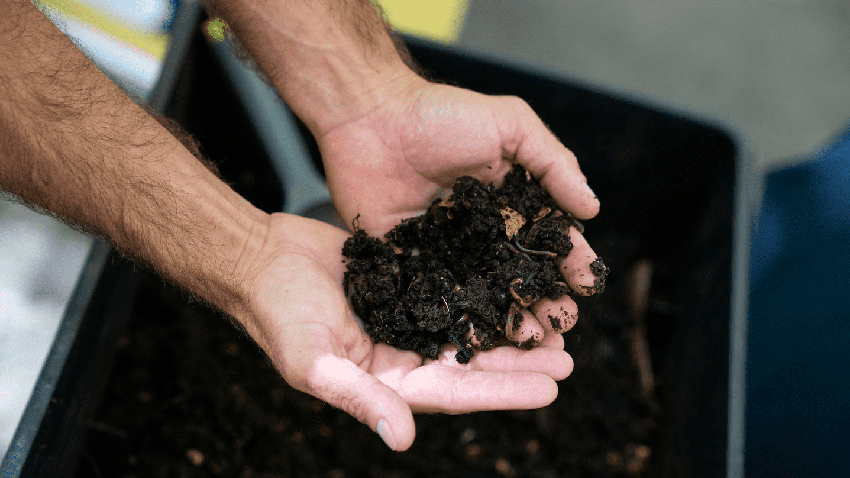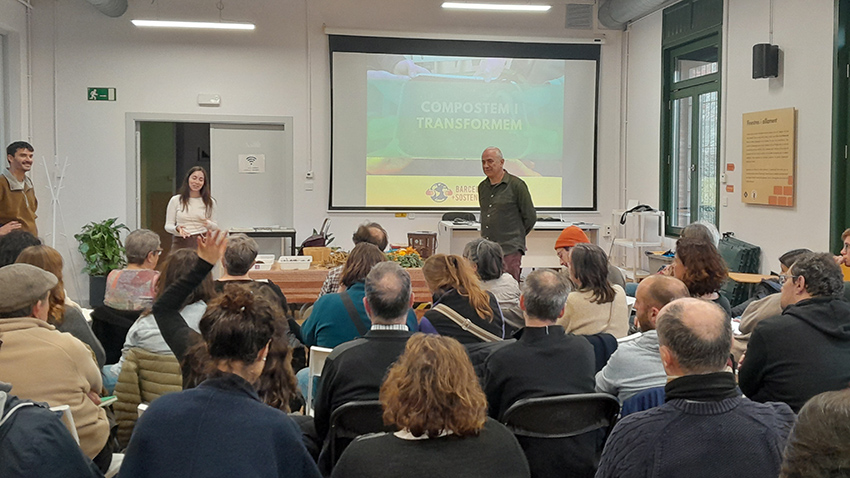Compostaje comunitario
<>El compostaje comunitario es una forma colectiva de gestionar, in situ, los restos de comida y jardinería de un mismo grupo, zona o equipamiento. Vecindario, familias, alumnos, personal y otros grupos participan en este aportando sus restos orgánicos para obtener compost, un recurso que retorna a la comunidad como abono para las plantas.
¿Qué es el compostaje?
El compostaje es un proceso similar al que tiene lugar de forma natural en los bosques. Diversos organismos descomponen los restos de materia orgánica y los transforman en compost, un abono natural rico en nutrientes. Este compuesto, con un aspecto y olor parecidos a los de la tierra húmeda, puede usarse en casas, patios, jardines y huertos para que las plantas crezcan más sanas y fuertes. El compostaje, si se hace correctamente, no provoca molestias ni malos olores y permite obtener aproximadamente 30 kg de compost de cada 100 kg de restos orgánicos.

¿Por qué fomentamos el compostaje comunitario en la ciudad?
La fracción orgánica tiene un gran peso dentro de los residuos municipales de Barcelona. Apostar por el compostaje comunitario es una forma de prevenirlos y de darles una nueva vida en origen.
El compostaje comunitario contribuye a:
- Cerrar el ciclo de la materia orgánica y favorecer la economía circular.
- Reducir los residuos a transportar y tratar fuera de la ciudad.
- Minimizar las emisiones de gases de efecto invernadero y contribuir a mitigar la emergencia climática.
- Fomentar el verde urbano, ya que el compost sirve como abono natural para las plantas de la ciudad.
- Promover la corresponsabilidad y la participación ciudadana, al crear vínculos y aprendizajes colectivos.
Por todo ello, el Ayuntamiento de Barcelona impulsa la Estrategia de compostaje comunitario de Barcelona 2024-2028, que recoge las acciones para ampliar y consolidar esta práctica en toda la ciudad (enlace).
La Estrategia de compostaje comunitario (ECC) se enmarca dentro del plan Residuo Cero Barcelona 2021-2027, que establece los retos estratégicos y los objetivos municipales para reducir la generación de residuos y avanzar hacia una ciudad más sostenible.

¿Cómo puedo participar en el compostaje comunitario?
Hay muchas formas de contribuir a una ciudad más circular. ¡Busca la tuya y descubre la vida que pueden dar tus residuos orgánicos!
Si eres un centro educativo, una entidad o una empresa
Si formas parte de una colectividad y queréis iniciar, ampliar o consolidar una iniciativa o proyecto de compostaje en vuestro centro, os animamos a participar en los siguientes servicios:
- Compostamos y transformamos: dirigido a entidades, empresas y comercios. Más información
- Compostamos y aprendemos: dirigido a centros educativos Más información
Con el objetivo de integrar el compostaje como una práctica cotidiana de prevención de residuos orgánicos en los centros, estos servicios ofrecen:
- Formación y asesoramiento técnico continuo para apoyar las iniciativas de compostaje.
- Cesión de compostadores y materiales necesarios para el compostaje.
- Visitas de asistencia y acompañamiento profesional a los centros.
- Espacios para compartir experiencias y aprendizajes con otros centros.
- La oportunidad de disfrutar de las ventajas de formar parte de una red más amplia.
Si eres vecino o vecina de Barcelona
Los puntos de compostaje comunitario municipal son espacios adaptados al medio urbano, ya que, por falta de espacio y tiempo, muchas personas y familias no pueden hacer compostaje directamente en sus domicilios.
En estos puntos pueden llevar sus restos orgánicos de cocina y jardinería (fruta, verdura, hojarasca, etc.) y, a cambio, recibir parte del compost resultante como abono para sus plantas en casa.
Puede participar cualquier ciudadano o ciudadana de Barcelona dirigiéndose especialmente al punto más cercano en cada vecindario. Por eso están dinamizados por entidades vinculadas al barrio o al territorio, las cuales organizan actividades y talleres sobre compostaje y sostenibilidad.
Para participar, solo hay que inscribirse como persona, familia o unidad de convivencia compostadora con el fin de recibir una pequeña formación de la entidad dinamizadora y empezar a llevar, de forma regular o puntual, los restos orgánicos de cocina o jardinería.
Consulta todos los puntos disponibles en el Mapa Barcelona + Sostenible. ¡Participa!

